Spiritual abuses in the Church. The spiritual father of the Roman seminary speaks
🇮🇹 Abusi spirituali. Don Giuseppe Forlai: "il buon padre spirituale è come un metro da sarto"
Spiritual and conscientious abuses in the Church are a risk we too often fail to take sufficiently into account. Silere non possum has addressed this problem many times and also deals with it in the Pharmakon column on priestly formation. In the April 2023 issue of the monthly magazine Jesus there is an interview with the Rev. Giuseppe Forlai, spiritual director of the Pontifical Roman Seminary. The priest offers several insights into the topic, which may help reflection.
Within the seminary of the Pope’s diocese, the formation team proposed to all seminarians the text Schiacciare l’animaby the Rev. Fr. Dysmas De Lassus O. Cart., which deals with this delicate problem in a masterly manner. The text is available in French, Spanish and German. Unfortunately, it is not yet available in English. It will be available from June 2023. These initiatives, therefore, are very positive and show how the Church is trying, with no little suffering, to address the problem and prevent its development.
F.P.
Silere non possum
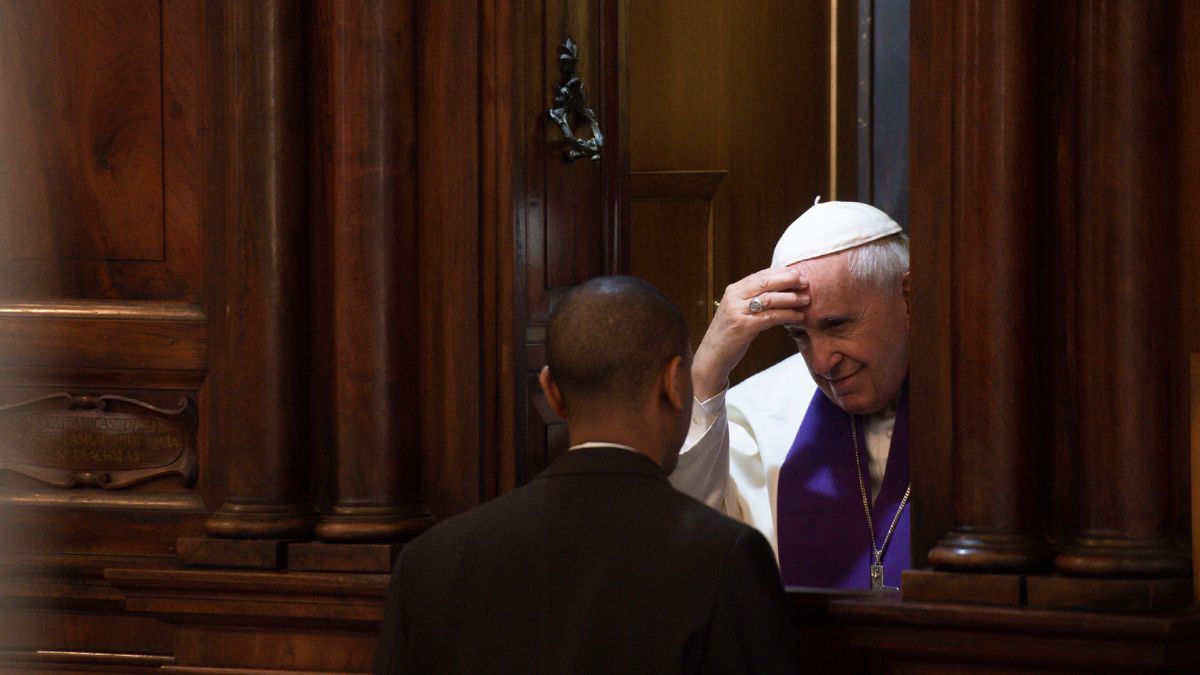
Fr Joseph, in your spiritual talks you have come across cases of abuse and manipulation. The news of these last few months refers us to stories of macroscopic gravity. You write that the first thing is to prevent. So help us to understand: who is at risk of manipulation?
«Those most at risk are people who need a lot of affective confirmation and who are looking for someone to decide for them, perhaps by bringing in the divine will. They desire, that is, a paternal gaze on their life, which gives them permission to exist, which sends a double message to the soul: ‘You are important’ and ‘you don’t risk anything because I’ll take care of it’. The manipulative relationship, in fact, never gives autonomy. In those who come to the seminary, we have not found cases of people being physically abused, but spiritually yes, by priests or charismatic leaders, even lay people, who have instilled in young people the conviction that they have a vocation. Saying ‘God’s will for your life is this’ is generally a form of spiritual abuse. And of these cases, in eleven years, I have found quite a few, at a rough guess I would say two out of every ten. In the seminary these people were given responsibility, they were given the tools to discern, and they left on their own, as soon as they started to breathe. But there have also been more difficult situations: if you have experienced an unhealthy fatherhood, in which you have been convinced that God loves you only if you become a priest (and I am not exaggerating), when you realise that that is not your deepest desire, then everything collapses. They are often very young boys, very attached to a presbyter or animator figure who has not been able to measure his authority towards them».
Did it happen to have guys sent by the same priest in series?
«Yes. In the seminary we work as a team, the educators and the rector notice immediately if a person has vocational substance or if the idea comes from conditioning. When a boy arrives, before the propaedeutic year, the educator in charge holds a series of in-depth interviews. Then there is also the psychological diagnostic. But it is above all in three areas that the authenticity of the vocation is seen: the love of prayer, the ability to forgive, the establishment of healthy relationships. Those who are pushed to enter the seminary by others are usually restless and cover their discomfort either with pseudo-mystical escapism or with pastoral hyper-activity, passed off as a spirit of service. It happens that sometimes the manipulator is not even aware of what he is producing in souls. Often one improvises oneself as a spiritual director to gratify personal needs: sometimes real emotional voids are filled with domination over people. The internal forum is where the evil one can reap more victims than one might think. In this we need more seriousness: sometimes it is thought that a newly ordained priest is capable of carrying out all the ministries entrusted to him. There are priests with a few years of Mass who serve as spiritual directors and preach exercises. The mystagogy of priestly life has disappeared from our horizon. There is no longer a desire to mature slowly in the field. But the consequences can be seen».
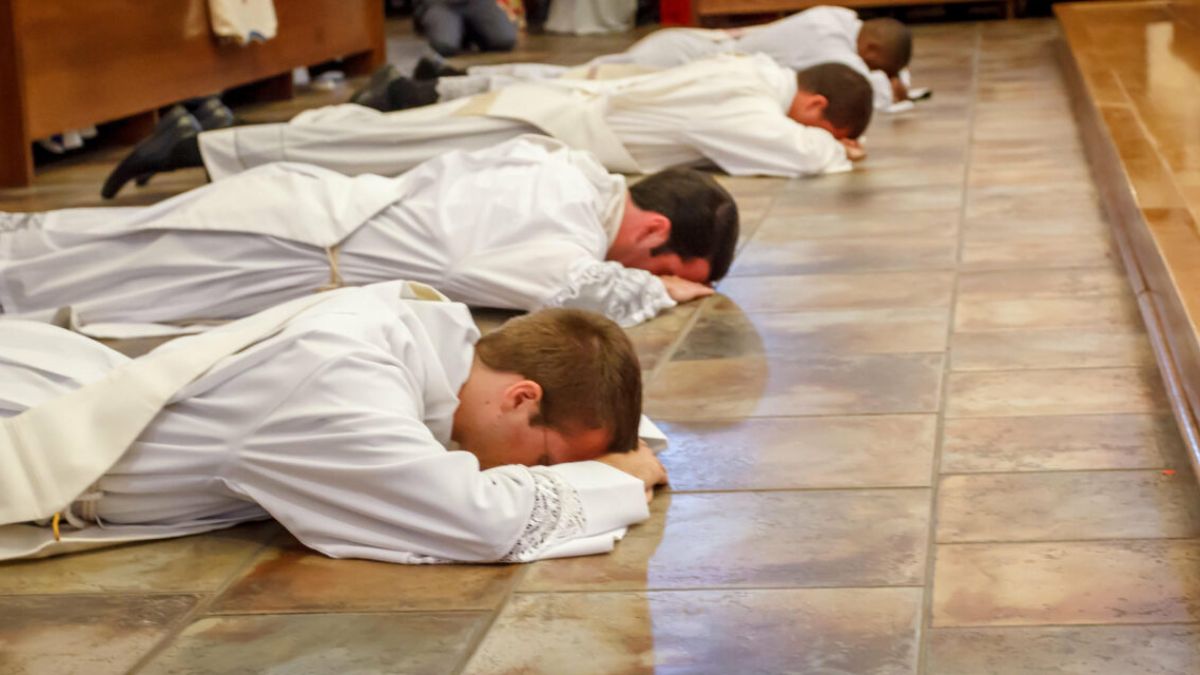
Are these situations more frequent today or are you just more careful?
«One is more careful than one used to be. Specifically spiritual abuse is very frequent, today more so than yesterday, because spiritual direction has come back very much 'in fashion', thanks to a certain generalised disorientation. Before, people rightly sought the ordinary confessor, now the spiritual director, sometimes in a morbid manner. A surrogate father. We live in a society where people are not listened to, where there are no points of reference, but many fears and anxieties. Having an adult who in the name of God tells you what to do is a great comfort. The healthy effort of thinking and seeking the Truth is apparently spared. The improvised spiritual father does not give tools to discern, to listen to God's word independently, to take responsibility in the Church, but he is the instrument. On the contrary, the shrewd one does not get in the way of the relationship between the subject and God, he simply verifies that the game has been played according to the rules of Christian life. To do this, one must have meditated and digested the doctrine of the great masters of the Spirit: Ignatius, Teresa, John of the Cross, Francis de Sales, to name but the best known. Some think they do not need to, relying only on what they 'hear' or 'believe': but in the Church, thank God, there is a very solid tradition on these issues. St Teresa of Avila was very clear about the doctrinal competence of the spiritual director. The attitude of self-proclaimed spiritual director, in the technical sense, is not only widespread among priests, but also in movements and ecclesial aggregations. Clericalism is also present among the laity. The urban legend that is spreading, whereby clericalism is eliminated by mortifying the clergy, is a dishonest naivety. It is worth remembering, however, that spiritual direction is a secondary, not primary means of Christian life: the Gospel and the sacraments are primary means, then there are the secondary ones, such as spiritual exercises and a particular devotion. The latter help greatly but are not essential for the sanctification of people.
One does not die without a spiritual director, it is much more important to learn to go to confession well and often».
What is the manipulator's profile?
«It is a person who claims a privileged relationship with God: 'I know ...', 'in prayer I have understood that ...', 'I have prayed a lot about your situation and I know that the Lord wants this'. Expressions already considered erroneous and to be avoided, as St Ignatius taught in the 15th annotation of his Exercises. The Desert Fathers gave their spiritual children only the pearls of the Gospel, with great freedom. St Benedict, in Chapter 58 of the Rule in which he instructs about the admission of candidates to the monastery, goes to great lengths to test them so that their true motives emerge. Moreover, the manipulator, and manipulative communities, always have an enemy - the bishop, a certain sector of the Church, a theologian - because it is easy to compact oneself when electing an adversary. There is a functional narrative to make founders look like scapegoats. I met one who complained of being persecuted by Freemasonry: when I asked him for details he could not give me a name or a circumstance. The manipulative founder usually plays the part of the persecuted in front of his own - to the point of shedding tears - but is overbearing with outsiders, sometimes even threatening. Another characteristic is that the manipulator/abuser is an absolute narcissist. He does not really love his spiritual children nor, after all, the works to which he has given birth.
When he ends, everything ends. If he is discovered, he is not interested in exonerating the community, because he cannot bear for his children to have a life after his end. Spiritual incest requires psychological murder. Another element that recurs often is that manipulators never have a problem with money. Because there is a part of the Church and of the faithful with many means that value them: gurus attract benefactors. The poor are never there. It is a transverse phenomenon with many facets. Finally, a component of these manipulative circles is familism, which is also the cause of the cover-ups. There is a demand to preserve a communion that is nothing but complicity, often at the expense of honesty. One denies the wrongdoings of the spiritual leader even when they are proclaimed, or even when the Church makes a clear ruling. This is diabolical: he who by his charm drew me back to the Church, now becomes the cause of its estrangement! People can fall into this error by reasoning roughly like this: since I rediscovered the faith with this person - the founder, the leader, the spiritual father - then I can only continue to live the faith with him. What has happened? That the bond, the gratitude, became the end of the line in the search for evangelical truth. The spiritual physiognomy of the leader becomes that of his followers. Instead, one must not bind oneself to anyone, as Jesus taught: "Call no one father on earth" (Matthew 23:9); this is extremely serious. One must be an adult, autonomous person, despite one's fears. To bind oneself to Christ, to the Gospel, one must be courageous, and also give oneself permission to risk something. We have a beautiful example in history: when St Francis died, lying on the ground, at Santa Maria degli Angeli, on the evening of 3 October 1226, the friars asked him to tell them something definitive, to help them walk truthfully according to the charism they had received. And Francis replies: "I have done my part, may Christ teach you yours". Only the evil one produces copies. Each of us must take the risk of following the Lord».
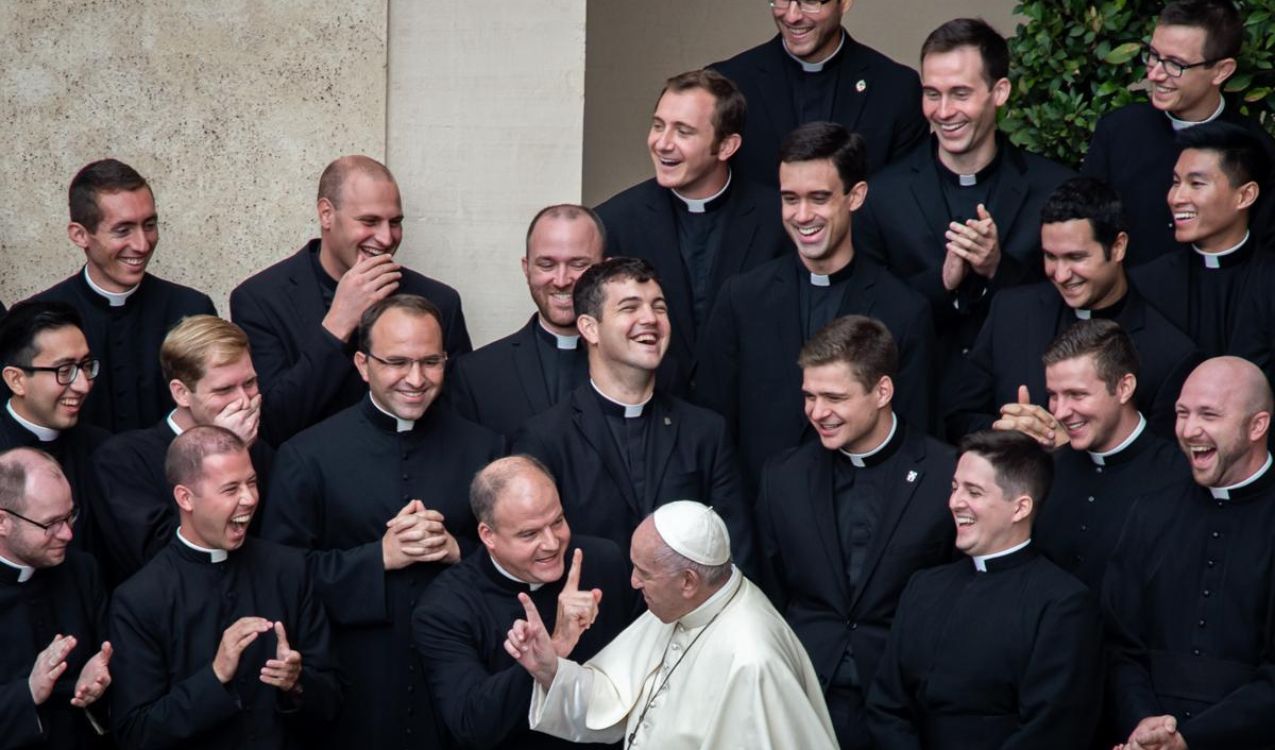
Rigidity is a signal of what?
«What is meant by rigidity? A priest who is clear in doctrine, who calls things by name, is not rigid, he is simply 'ecclesial', he transmits what he has received. Rigidity refers to the sphere of the will, to how I put into practice in life the truth that has been given to me. A canonist friend, Fr. Ottavio De Bertolis, gave a very nice example: he took a ruler and a tailor's tape measure. Both instruments show centimetres, but the former is rigid, the latter measures according to the person's shape. Manipulators are very clear usually, but they have no pedagogy: they tell you what to do, but not how to get to things. They are rulers, not tape measure; they show you the goal, not the way. Because they haven't walked it either!»
Can charisma be dangerous?
«The authentic educator is one who disappears at some point. There are many charismatic people, but sometimes we naively confuse notoriety with charisma. A charism is certain when it is recognised by the Church. At least this is the fundamental filter. The great saints when they realised they had extraordinary gifts tried to hide them. No saint ever sought notoriety. Having a charisma does not automatically mean being legitimised to carry out a ministry. Here, too, a very simple instruction from the Desert Fathers: anyone who proposes himself to another as a spiritual father should be immediately shunned. For one is chosen as a father, one does not choose one's children».
How does the abusive report develop? What needs to be looked out for?
«It is progressive. In the beginning there is a great welcome and an apparent appreciation, which in reality is seduction. Then the person is isolated from his or her usual relational context. It is a typical dynamic, even in the animal world: one waits for the prey to move away from the group before launching the attack. The affective range is reduced: the relationship becomes increasingly exclusive with the leader figure and the other 'children', in a top-down relationship. One of the three subsidies produced by the Italian Bishops' Conference on the subject of abuse (Initial Formation in Times of Abuse) - very useful and enlightening - describes the abusive environment very well, highlighting how it cannot be given where there is a multiplicity of relationships and intergenerational exchange. For example: a community largely composed of young people is more prone to the occurrence of abuse. Where there is manipulation, a toxic concept of obedience, linked only to the superior, is also inculcated. In the monastic and religious tradition, on the other hand, obedience is at three levels: to the Gospel, to the Rule and to the superior, where the first two are the guarantee that saves from the arbitrariness of a possible unfree superior».
In many cases, even in the face of accusations, the abuser seems to be unaware of his guilt. Is it just fiction or is there more to it?
«The pathological narcissist knows he is doing evil, otherwise in the face of proven accusations he would not deny it. But he spiritualises, that is, he thinks he is proposing a way "that the Church cannot yet understand". One must be careful, because there is a very thin membrane of separation between spirituality and sexuality, especially in those spiritual currents where much emphasis is placed on the progressive action of the Holy Spirit, separating it from the Word, from the example of Christ who rules our daily existence. The Spirit without λόγος is not the Holy Spirit who proclaims the Church. Sometimes, as a friar used to say, 'one speaks of spirituality only not to speak of morality'! The Pseudo-Macarius, in the 4th century, taught that although filled with the Spirit, there may at the same time remain dimensions of my existence that I cannot master through temperance.
Two paths of thought develop from here: one says that one must work humbly on what is not yet transfigured, relying on grace; and another teaches that everything one experiences, even sexually, is now transformed; sin is there but is no longer imputable. In other words, sexual disorder, even if acted upon, would no longer be sin because the Holy Spirit has already erased malice at its root. It is a historically recurring drift - often an appendage of Gnostic circles - that we find for example in the Chlysty, a sect said to still exist in Russia, born just before the mid-1600s, to which the infamous Grigory Rasputin (+1916), the pseudo lay mystic, spiritual father of Tsar Nicholas II, who had uninhibited sexual habits, probably belonged. We are not dealing here with mere carnal weaknesses, but with a conscious 'theological' system that mystically rationalises what the ego cannot integrate».
But how can you tell if you are being manipulated?
«The proof is very simple. The manipulator never makes you disconnect from him. If you say to him, 'We have been walking together for years, I feel the need to talk to this other person,' and he replies, 'go ahead, you are grown up enough to make up your mind,' then you can be calm. On the contrary, if he starts holding you back, perhaps talking about God 'who brought us together', then you have to become very wary. Freedom in detachment - in the person accompanied and in the accompanying person - is the litmus test».
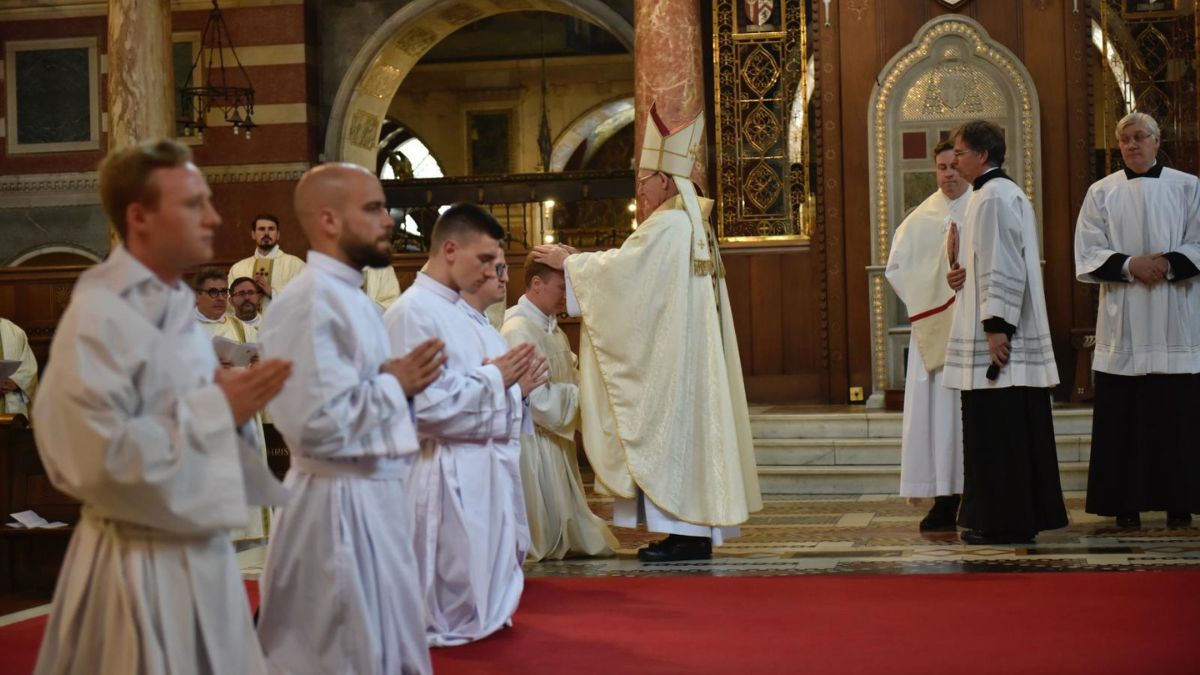
Who should you talk to if you suspect you are being manipulated?
«It is one thing to feel manipulated, it is another thing to be objectively abused. Some people may feel manipulated but are not really manipulated. However, if a relationship is objectively constricting, you have to go and talk to a priest - preferably your priest (our parish priests usually possess the great charisma of normality) - or to the bishop: to someone, in short, who has the ability to objectify the matter, outside the manipulator's magic circle. One can also turn to the Child Protection Service, which is now present in every diocese. It is very discreet, it gives information and support, helping to discern; it does not only address minors, but also vulnerable people and those experiencing moments of fragility».
Is the phenomenon of manipulation more frequent in the religious sphere?
«It is a transversal social phenomenon. It can occur in psychotherapy, in sport, in schools.... Certainly, religious motivation can burden the abuse more, binding the conscience. In the past, people reasoned in this way: it was better 'not to let it be known' because the scandal harms the Church; today we realise that silence harms more than scandal. People cannot stand cover-ups. But we must remember that the victims must be helped and the guilty punished and put in a situation where they do no harm... But this does not mean revealing everything except what is unavoidable for procedural purposes: Canon 220 of the Code of Canon Law is very clear. People - all of them - have the right to keep a good reputation as far as possible. There are no 'monsters', only children of God who make mistakes».
Today there is talk of zero tolerance...
«I do not like this expression, it is not evangelical and risks being hypocritical. Those who examine these situations every day in the Vatican Dicasteries in charge tell me that in the seminary reports there was already everything written down that needed to be known in order to make a serious decision. But the subjects were ordered anyway for 'mysterious' reasons. Trainers should be able to distinguish growth problems from structural problems. But that is another matter. What I mean is that when one orders a notoriously problematic subject, one cannot later invoke zero tolerance if untoward things happen. It is too convenient to reduce to the lay state a minister of whom it was already known that he did not meet the minimum requirements to be ordained».
It is known that, even in Italy, there are dioceses that take in seminarians discharged from other formation structures...
«It used to happen, now much less. My experience is this: we had boys who had been discharged from another seminary. And we discovered this on our own, without the sending bishop telling us. The Ratio fundamentalis on the formation of priests, in No. 205, provides that the rector should have all the necessary information on the candidate, including the written outcome of the previous formative stage, lived in another place. It is an obligation, not a courtesy. One should just be honest».
Why do they do it? Are they worried about the lack of vocations?
«I can't answer that exactly. It could be so. It may happen that some bishops fall into the deception of believing they know more than the formators. Thank God it is rare; there is now advanced collaboration. An episode from a few years ago: faced with a negative report on a young man's suitability for ordination, the bishop replied to the formators: 'I know him, you know him!' In fact, he saw him twice a year during the holidays! Humility would solve a lot of problems».
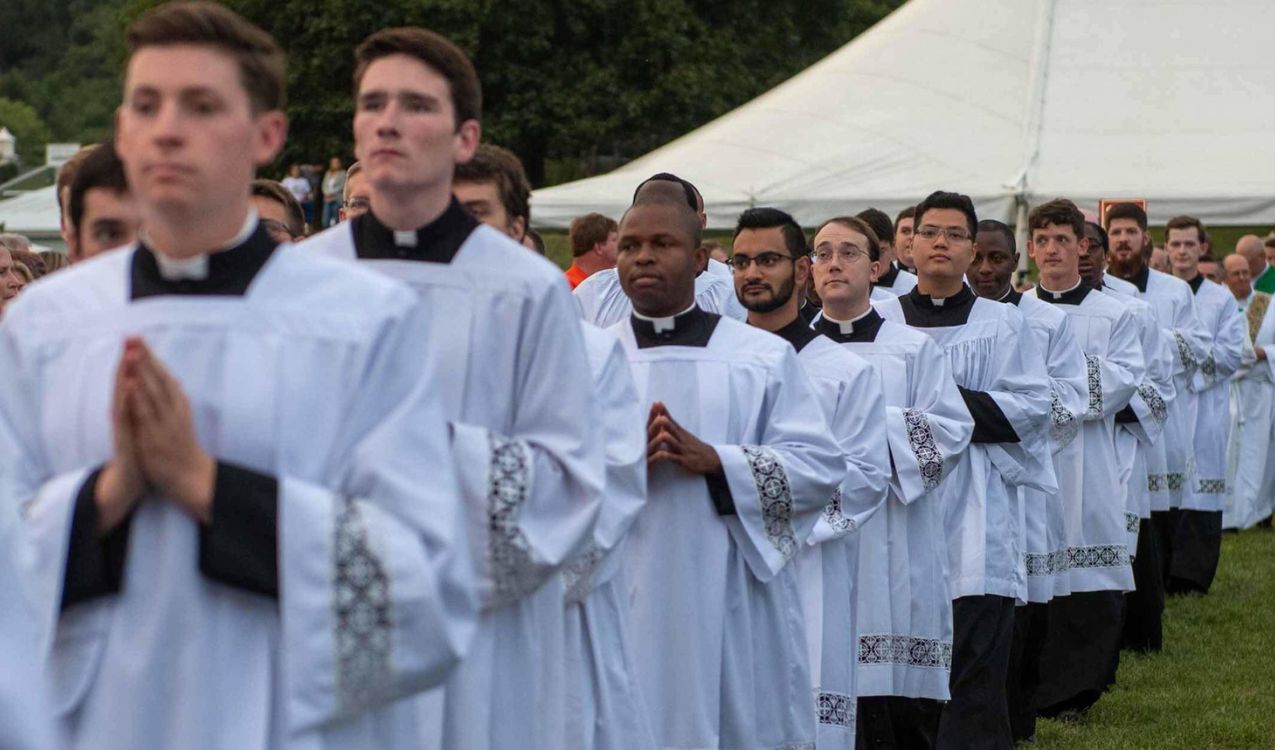
Fr Giuseppe Forlai, 51, has been the spiritual director of the Pontifical Roman Major Seminary for 11 years. A former parish vicar, chaplain in penitentiary institutions and professor of religion, he holds a doctorate in Dogmatic Theology and teaches at the Claretianum Institute of Theology of Consecrated Life.
Article published in the April issue of the magazine Jesus. We thank Edizioni San Paolo for their kind permission.